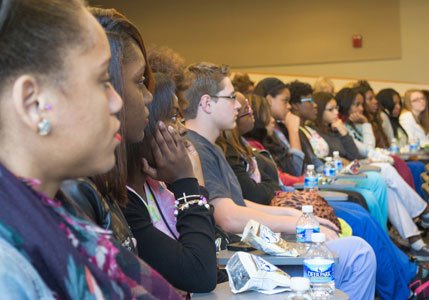BALTIMORE — A new program at the University of Maryland, Baltimore (UMB) is aimed at changing the way that Baltimore’s children think about their futures, according to Congressman Elijah E. Cummings, D-7th.
The new initiative is aimed at increasing diversity in the health work force by leading Baltimore City middle school students into rewarding, highly skilled careers in cancer research and health care. The project, called the UMB CURE Scholars Program, is funded with a $750,000, two-year grant from the National Cancer Institute (NCI), part of the National Institutes of Health.
The UMB CURE program addresses two important disparities. Cancer occurs in higher rates in African-Americans, particularly in socioeconomically challenged neighborhoods such as West Baltimore. At the same time, a relatively small proportion of cancer researchers and clinicians are white.
At a news conference announcing the program on Tuesday, October 28,2014, Cummings described his own fight to seek higher education. Cummings was raised in poverty by parents who worked blue-collar jobs, and he contended with many racial barriers to civil rights in order to fulfill his own dream.
“This is about helping our children to dream,” Cummings said of the UMB CURE program. “The way I had to get my dream was through some pain of trying to break through the walls of segregation. That’s not the way it should be done. I wish I had had a program like this.”
UMB CURE is a partnership between UMB and the University of Maryland Greenebaum Cancer Center, and could entail further partnerships with other entities such as historically black colleges and universities in the area, the Baltimore City Public Schools, biomedical research companies and more.
“The intent of the program is to put talented, curious students from our west Baltimore community on a path to rewarding, meaningful, well paying careers in cancer-related health care and research,” said Jay A. Perman, MD, president of the University of Maryland, Baltimore and a co-investigator on the project.
Researchers will develop the program over the next year. Beginning in the 2015 school year, researchers will select 25 middle school students from West Baltimore to participate. Though details of the program have not yet taken shape, it will aim to provide its participants with hands-on experience in laboratories. The students likely will have mentorship or internship opportunities with college students, laboratory employees and others at the Greenebaum Cancer Center. There may be opportunities to increase cancer literacy in the students’ communities with educational events.
“Partnerships of this type are critical if we’re serious about changing the demographics of cancer and the biomedical work force,” said Sanya A. Springfield, PhD, director of the NCI’s Center to Reduce Cancer Health Disparities, which is funding the UMB CURE project. “More minorities die from cancer and there is a dearth of individuals from underrepresented populations entering the biomedical workforce enterprise. Our job here is to try to fix that.”
